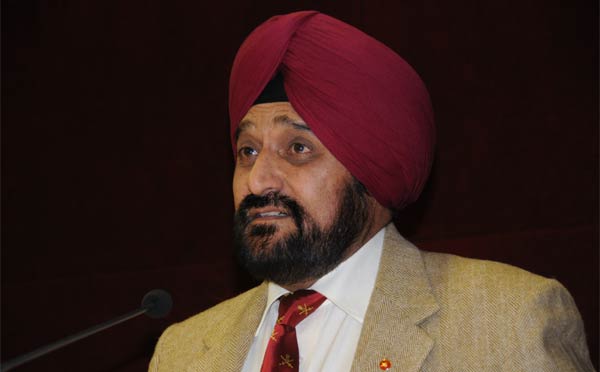
- This event has passed.
Eminent Persons’ Lecture Series – Lecture by General Bikram Singh on “Challenges for the Indian Army in the 21st Century”
January 23, 2013

On January 23, 2013, as part of its ‘Eminent Persons’ Lecture Series, IDSA organized a lecture by General Bikram Singh, PVSM, UYSM, AVSM, SM, VSM, ADC, Chief of the Army Staff, on “Challenges for the Indian Army in the 21st Century”. General Singh delivered his talk on the challenges facing the Indian Army from the perspective of its charter as defined in the Constitution of India and the role assigned to the Army as part of the strategic guidance which it receives from the Raksha Mantri. The talk took into account the existing security environment, the internal and the external dynamics, and their impact on the role of the Army. The Chief also made mention of measures which would ensure that the Army continues to be a force for national unity in the 21st century.
While providing a perspective on various countries of Asia, General Bikram Singh mentioned that China continued on its path of ‘peaceful economic rise’ and has set its sights to become a regional power by 2025 and a global power by 2050. He highlighted China’s increasing infrastructural footprints in the neighbourhood. As regards Pakistan, the General highlighted the high levels of terrorist and sectarian violence prevalent currently and said it was unlikely that any improvement would manifest in the immediate future. He mentioned that the Pakistani stance is defined in terms of the two extremities of the conflict spectrum viz. low intensity conflict and the threat held out by Pakistan of a nuclear war. He opined that the two main issues of concern at the moment in Pakistan are its unemployed youth who are potential recruits for the terrorist groups and the ‘unconstitutional’ power enjoyed by its Army. Given the trust deficit that exists between India and Pakistan, General Singh said that there was a requirement of being cautious in our dealings with that country.
General Singh thereafter made a brief mention of the good relations India shares with its other neighbours and highlighted the contribution of the Army in furthering these relationships. In the extended neighbourhood, the future of Afghanistan, according to General Singh, is a cause of concern. Post US withdrawal in 2014 and given the poor state of security mechanism there, it is likely that there may be spill over effects of any resultant adversities in India. On the US, the Chief, described it as a ‘de facto neighbour of India’, due to it being a resident power in the region for many decades. The Indo-US relations in the military domain are on the rise and it gives an opportunity for the Indian Army to gain access to high end technology while developing a certain degree of compatibility in operations with the US Army.
Speaking on the internal security dimension, General Singh opined that the situation in Jammu & Kashmir though militarily under control has the potential to flare up given the support it receives from Pakistan. In the North East, the situation is improving and lies mainly in the realm of law and order. Left Wing Extremism is the problem which is current and requires a multi-pronged approach at the governmental level. In the Chief’s view, deployment of the Army should not be part of the solution as it militates against training and preparations for the Army’s conventional role. There are agencies within the country, some of which need to build up their capabilities, to tackle this menace.
The Chief thereafter discussed the Indian Army’s interpretation of the theoretical construct of combat power. He covered the issue in terms of the conceptual, moral and physical dimensions. He also dwelt briefly on the dimensions of war and our preparations.
While speaking on the challenges facing the Indian Army, the Chief emphasised on the necessity of versatile military leadership which can brave the complexities of the full spectrum of conflict. Ability to orchestrate and win a war of manoeuvre will test the mettle of the military leaders. The challenge before the Indian Army, therefore, is to train its leadership to fight in the full spectrum of conflict, with special emphasis for its leaders to be proficient in manoeuvre warfare. Speaking on the conceptual dimension of war, the Chief highlighted that the challenge for the Army would be to define and accomplish political aims in a war which may possibly be of short duration.
Maintenance of strategic balance against possible adversaries is another challenge described by General Bikram Singh. India has unresolved borders which require to be guarded at all times while concurrently tackling proxy war and terrorism. The endeavour is to counter the ongoing sub-conventional threats while maintaining a posture of strategic balance to tackle other threats.
In the moral arena, the challenge for the Indian Army is recruitment of motivated citizens who are ready to face dangers, even situations of near certain death, in the course of their duty. Speaking further on the man-management issues, he also highlighted the need for proper comprehension of human resource issues by the leadership in view of the socio-economic changes in the country and the rising aspirations of its citizens.
General Singh spoke about the impact of media in perception management. He was quite categorical in his assertion that the use of social media by parties inimical to the country can have adverse impact on the Army. The Chief assured the audience that the Army is prepared to meet this challenge.
While speaking on the challenge in the field of physical dimension of war, General Singh made a mention of resource management including equipment. The audience was assured that adequate measures were in place to make certain that the Army remains in fine fettle.
On that positive note General Bikram Singh concluded his talk. Thereafter, he answered all the questions that were raised by the audience.



